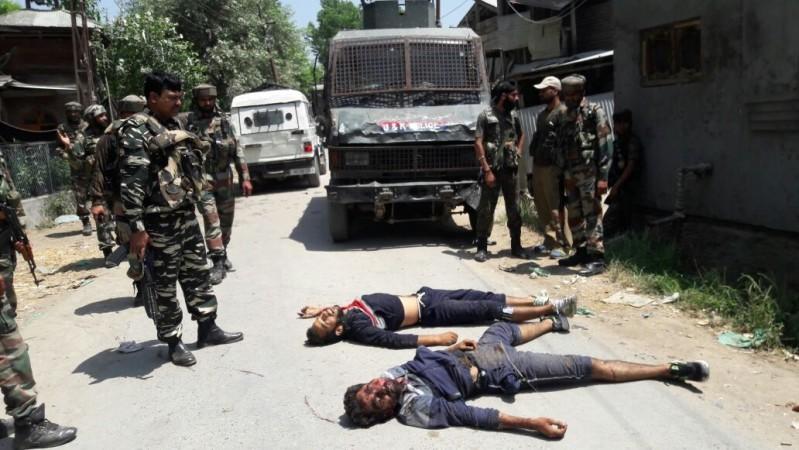
Abid Hussain Lone had returned to his native village Karimabad in the volatile Pulwama district of Jammu and Kashmir last year. He completed his MBA degree from a university in Indonesia and had married there. The couple now has a three-month-old baby. Abid left behind the career opportunities that laid before him to come home and live with his mother and wife.
His only brother is also pursuing an MBA from Bengaluru. Abid is one of the civilians killed in Sirnoo, Pulwama, where a gunfight broke between the security forces and militants.
Besides, Abid there have been many civilian casualties in this South Kashmir hamlet.
The number of dead civilians is only rising as unconfirmed reports suggest that the death toll has already reached seven. Many injured have been admitted to Distric Hospital Pulwama and some have been rushed to Srinagar. Abid and his neighbour were present in the Sirno village where the encounter took place.
The horror of civilian deaths at the site of encounters in Kashmir has again resurfaced with the fresh casualties reported from the Pulwama district of volatile South Kashmir.
Only two months back, six civilians were killed by a blast from an unexploded shell at an encounter site in Kulgam district of South Kashmir. There were reports of valley wide protests and shudowns over the Kulgam killings. Serious questions were also raised on the Standard Operation Procedures (SOPs) followed by the security forces during the encounters with the militants especially the sanitisation of the encounter site after the gunfight is over.
The preliminary reports in Kulgam incident suggested that the encounter site was not completely sanitised by the security forces and as soon as the encounter got over, the people from adjoining villages rushed to the site and were killed by the blast.
The leaders cutting across the part lines have also raised serious questions on the procedures followed by the security forces during encounters.
Former J&K Chief Minister Omar Abdullah while condeming the Pulwama killings also took a dig at the security forces calling it a "badly executed encounter."
He tweeted, "6 civilians killed and numerous more injured, many critically. Any way you look at it this was a badly executed encounter. Protests around encounter sites are now the norm not the exception. Why are we unable to learn how to handle them better?"
6 civilians killed and numerous more injured, many critically. Any way you look at it this was a badly executed encounter. Protests around encounter sites are now the norm not the exception. Why are we unable to learn how to handle them better?
— Omar Abdullah (@OmarAbdullah) December 15, 2018
Peoples Conference President Sajad lone minced no words in condeming the operation procedures. He tweeted, "The preparedness of security forces would in the Pulwama context be the ability to make the distinction between combatants and non combatants. If u end up killing 7 civilians in order to kill 3 militants. It is time for heads to roll. We can't afford a state of impunity."
The preparedness of security forces would in the Pulwama context be the ability to make the distinction between combatants and non combatants. If u end up killing 7 civilians in order to kill 3 militants. It is time for heads to roll. We can't afford a state of impunity. — Sajad Lone (@sajadlone) December 15, 2018
Former Chief Minister Mehbooba Mufti tweeted, "How long are we going to shoulder the coffins of our youngsters? So many civilians killed today post encounter in Pulwama. No country can win a war by killing its own people. I strongly condemn these killings , and once again appeal for efforts , to stop this blood bath."
How long are we going to shoulder the coffins of our youngsters? So many civilians killed today post encounter in Pulwama. No country can win a war by killing its own people. I strongly condemn these killings , and once again appeal for efforts , to stop this blood bath .
— Mehbooba Mufti (@MehboobaMufti) December 15, 2018
But a senior Army official said that it is the crowd management which sometimes becomes difficult for the police and security officials to contain during the encounters.
There have also been cases of people resorting to stone pelting at the encouner sites especially when local militants are engaged in it.
"It is a fact that people who are the relatives or neighbours of these militants sometimes do put brakes on the process and want the militants to escape. As such, the police and CRPF resort to tear gas shelling or firing pellets for crowd dispersal," an official wishing anonymity told the International Business Times, India.
Last month, a video which showed civilians helping a militant escape the encounter site in Chattergam in the outskirts of Srinagar had gone viral. The families of the slain civilians, however, confront such reports saying that their kins are nor stone throwers and usually are bystanders.
An official report by the J&K government said that nearly 94 civilians were killed this year during the protests or at encounter sites which has propelled many humanitarian oganisations urge the Indian security forces to use non-lehal weapons for crowd dispersal.















